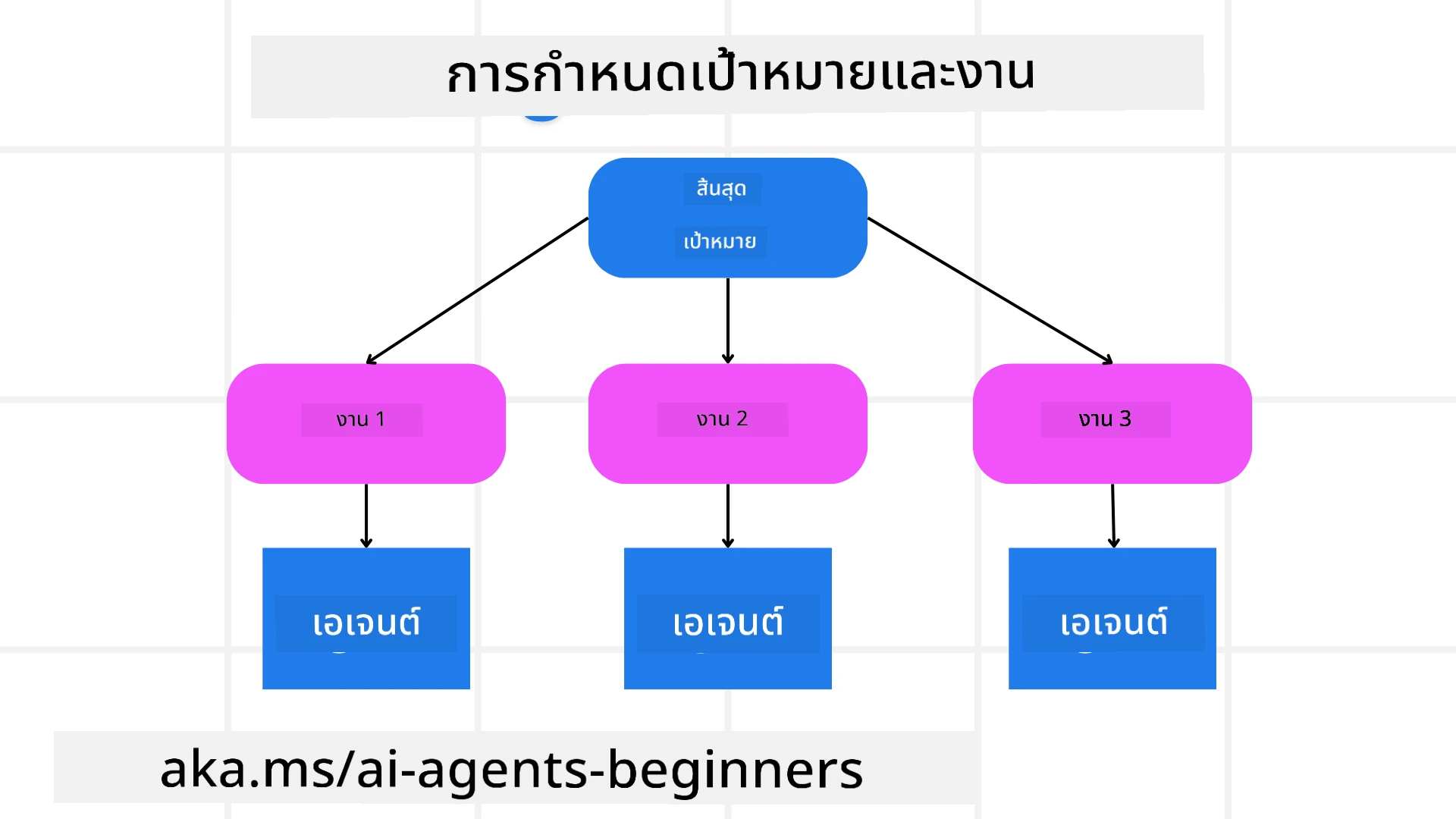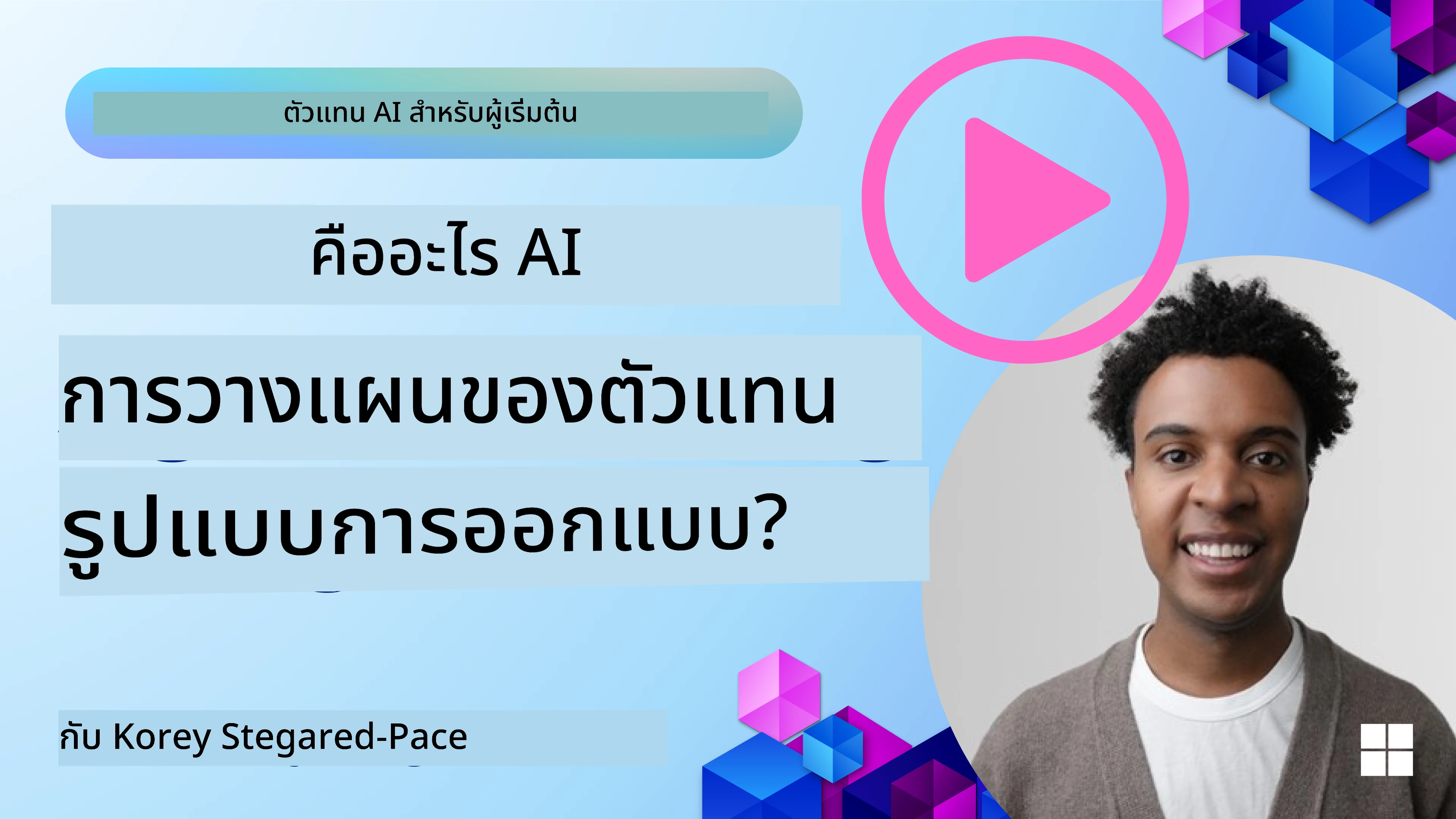ai-agents-for-beginners
(คลิกที่ภาพด้านบนเพื่อดูวิดีโอของบทเรียนนี้)
การออกแบบการวางแผน
บทนำ
บทเรียนนี้จะครอบคลุมถึง
- การกำหนดเป้าหมายโดยรวมที่ชัดเจนและการแบ่งงานที่ซับซ้อนออกเป็นงานย่อยที่จัดการได้
- การใช้ผลลัพธ์ที่มีโครงสร้างเพื่อให้ได้คำตอบที่เชื่อถือได้และอ่านได้โดยเครื่อง
- การใช้แนวทางที่ขับเคลื่อนด้วยเหตุการณ์เพื่อจัดการงานแบบไดนามิกและข้อมูลที่ไม่คาดคิด
เป้าหมายการเรียนรู้
หลังจากจบบทเรียนนี้ คุณจะเข้าใจเกี่ยวกับ:
- การระบุและตั้งเป้าหมายโดยรวมสำหรับ AI agent เพื่อให้แน่ใจว่า agent รู้ว่าต้องบรรลุอะไร
- การแบ่งงานที่ซับซ้อนออกเป็นงานย่อยที่จัดการได้และจัดลำดับงานเหล่านั้นในลำดับที่มีเหตุผล
- การเตรียม agent ด้วยเครื่องมือที่เหมาะสม (เช่น เครื่องมือค้นหาหรือเครื่องมือวิเคราะห์ข้อมูล) การตัดสินใจว่าเมื่อใดและอย่างไรที่จะใช้เครื่องมือเหล่านี้ และการจัดการสถานการณ์ที่ไม่คาดคิด
- การประเมินผลลัพธ์ของงานย่อย วัดผลการดำเนินงาน และปรับปรุงการดำเนินการเพื่อเพิ่มคุณภาพของผลลัพธ์สุดท้าย
การกำหนดเป้าหมายโดยรวมและการแบ่งงาน

งานในโลกจริงส่วนใหญ่มีความซับซ้อนเกินกว่าจะจัดการได้ในขั้นตอนเดียว AI agent จำเป็นต้องมีวัตถุประสงค์ที่ชัดเจนเพื่อเป็นแนวทางในการวางแผนและการดำเนินการ ตัวอย่างเช่น ลองพิจารณาเป้าหมาย:
"สร้างแผนการเดินทาง 3 วัน"
แม้ว่าเป้าหมายนี้จะดูเรียบง่าย แต่ยังต้องมีการปรับแต่งเพิ่มเติม ยิ่งเป้าหมายชัดเจนมากเท่าไร agent (และผู้ร่วมงานที่เป็นมนุษย์) ก็จะสามารถมุ่งเน้นไปที่การบรรลุผลลัพธ์ที่ถูกต้องได้ดีขึ้น เช่น การสร้างแผนการเดินทางที่ครอบคลุมพร้อมตัวเลือกเที่ยวบิน คำแนะนำโรงแรม และกิจกรรมที่น่าสนใจ
การแบ่งงาน
งานที่ใหญ่หรือซับซ้อนจะจัดการได้ง่ายขึ้นเมื่อแบ่งออกเป็นงานย่อยที่มีเป้าหมายชัดเจน ตัวอย่างเช่น สำหรับแผนการเดินทาง คุณสามารถแบ่งเป้าหมายออกเป็น:
- การจองเที่ยวบิน
- การจองโรงแรม
- การเช่ารถ
- การปรับแต่งตามความต้องการ
งานย่อยแต่ละงานสามารถจัดการได้โดย agent หรือกระบวนการเฉพาะทาง ตัวอย่างเช่น agent หนึ่งอาจเชี่ยวชาญในการค้นหาข้อเสนอเที่ยวบินที่ดีที่สุด อีกตัวหนึ่งเน้นการจองโรงแรม เป็นต้น จากนั้น agent ที่ทำหน้าที่ประสานงานหรือ “downstream” สามารถรวบรวมผลลัพธ์เหล่านี้เป็นแผนการเดินทางที่สมบูรณ์สำหรับผู้ใช้งาน
วิธีการแบบแยกส่วนนี้ยังช่วยให้สามารถปรับปรุงได้ทีละขั้นตอน ตัวอย่างเช่น คุณสามารถเพิ่ม agent เฉพาะทางสำหรับคำแนะนำด้านอาหารหรือกิจกรรมในพื้นที่ และปรับปรุงแผนการเดินทางให้ดีขึ้นเรื่อย ๆ
ผลลัพธ์ที่มีโครงสร้าง
Large Language Models (LLMs) สามารถสร้างผลลัพธ์ที่มีโครงสร้าง (เช่น JSON) ซึ่งง่ายต่อการแยกวิเคราะห์และประมวลผลโดย agent หรือบริการที่เกี่ยวข้องในขั้นตอนถัดไป สิ่งนี้มีประโยชน์อย่างยิ่งในบริบทของ multi-agent ซึ่งเราสามารถดำเนินการตามงานเหล่านี้หลังจากได้รับผลลัพธ์การวางแผน
สำหรับภาพรวมอย่างรวดเร็ว
ตัวอย่างโค้ด Python ด้านล่างแสดง agent การวางแผนที่เรียบง่ายซึ่งแบ่งเป้าหมายออกเป็นงานย่อยและสร้างแผนที่มีโครงสร้าง:
from pydantic import BaseModel
from enum import Enum
from typing import List, Optional, Union
import json
import os
from typing import Optional
from pprint import pprint
from autogen_core.models import UserMessage, SystemMessage, AssistantMessage
from autogen_ext.models.azure import AzureAIChatCompletionClient
from azure.core.credentials import AzureKeyCredential
class AgentEnum(str, Enum):
FlightBooking = "flight_booking"
HotelBooking = "hotel_booking"
CarRental = "car_rental"
ActivitiesBooking = "activities_booking"
DestinationInfo = "destination_info"
DefaultAgent = "default_agent"
GroupChatManager = "group_chat_manager"
# Travel SubTask Model
class TravelSubTask(BaseModel):
task_details: str
assigned_agent: AgentEnum # we want to assign the task to the agent
class TravelPlan(BaseModel):
main_task: str
subtasks: List[TravelSubTask]
is_greeting: bool
client = AzureAIChatCompletionClient(
model="gpt-4o-mini",
endpoint="https://models.inference.ai.azure.com",
# To authenticate with the model you will need to generate a personal access token (PAT) in your GitHub settings.
# Create your PAT token by following instructions here: https://docs.github.com/en/authentication/keeping-your-account-and-data-secure/managing-your-personal-access-tokens
credential=AzureKeyCredential(os.environ["GITHUB_TOKEN"]),
model_info={
"json_output": False,
"function_calling": True,
"vision": True,
"family": "unknown",
},
)
# Define the user message
messages = [
SystemMessage(content="""You are an planner agent.
Your job is to decide which agents to run based on the user's request.
Provide your response in JSON format with the following structure:
{'main_task': 'Plan a family trip from Singapore to Melbourne.',
'subtasks': [{'assigned_agent': 'flight_booking',
'task_details': 'Book round-trip flights from Singapore to '
'Melbourne.'}
Below are the available agents specialised in different tasks:
- FlightBooking: For booking flights and providing flight information
- HotelBooking: For booking hotels and providing hotel information
- CarRental: For booking cars and providing car rental information
- ActivitiesBooking: For booking activities and providing activity information
- DestinationInfo: For providing information about destinations
- DefaultAgent: For handling general requests""", source="system"),
UserMessage(
content="Create a travel plan for a family of 2 kids from Singapore to Melboune", source="user"),
]
response = await client.create(messages=messages, extra_create_args={"response_format": 'json_object'})
response_content: Optional[str] = response.content if isinstance(
response.content, str) else None
if response_content is None:
raise ValueError("Response content is not a valid JSON string" )
pprint(json.loads(response_content))
# # Ensure the response content is a valid JSON string before loading it
# response_content: Optional[str] = response.content if isinstance(
# response.content, str) else None
# if response_content is None:
# raise ValueError("Response content is not a valid JSON string")
# # Print the response content after loading it as JSON
# pprint(json.loads(response_content))
# Validate the response content with the MathReasoning model
# TravelPlan.model_validate(json.loads(response_content))
Agent การวางแผนที่มีการประสานงานหลาย agent
ในตัวอย่างนี้ Semantic Router Agent จะรับคำขอจากผู้ใช้ (เช่น “ฉันต้องการแผนโรงแรมสำหรับการเดินทางของฉัน”)
จากนั้น planner จะ:
- รับแผนโรงแรม: planner จะรับข้อความของผู้ใช้และสร้างแผนการเดินทางที่มีโครงสร้างโดยอิงจาก system prompt (รวมถึงรายละเอียด agent ที่มีอยู่)
- แสดงรายการ agent และเครื่องมือของพวกเขา: registry ของ agent จะเก็บรายการ agent (เช่น สำหรับเที่ยวบิน โรงแรม การเช่ารถ และกิจกรรม) พร้อมฟังก์ชันหรือเครื่องมือที่พวกเขาเสนอ
- ส่งแผนไปยัง agent ที่เกี่ยวข้อง: ขึ้นอยู่กับจำนวนงานย่อย planner จะส่งข้อความไปยัง agent เฉพาะ (สำหรับสถานการณ์ที่มีงานเดียว) หรือประสานงานผ่าน group chat manager สำหรับการทำงานร่วมกันของหลาย agent
- สรุปผลลัพธ์: สุดท้าย planner จะสรุปแผนที่สร้างขึ้นเพื่อความชัดเจน
ตัวอย่างโค้ด Python ด้านล่างแสดงขั้นตอนเหล่านี้:
from pydantic import BaseModel
from enum import Enum
from typing import List, Optional, Union
class AgentEnum(str, Enum):
FlightBooking = "flight_booking"
HotelBooking = "hotel_booking"
CarRental = "car_rental"
ActivitiesBooking = "activities_booking"
DestinationInfo = "destination_info"
DefaultAgent = "default_agent"
GroupChatManager = "group_chat_manager"
# Travel SubTask Model
class TravelSubTask(BaseModel):
task_details: str
assigned_agent: AgentEnum # we want to assign the task to the agent
class TravelPlan(BaseModel):
main_task: str
subtasks: List[TravelSubTask]
is_greeting: bool
import json
import os
from typing import Optional
from autogen_core.models import UserMessage, SystemMessage, AssistantMessage
from autogen_ext.models.openai import AzureOpenAIChatCompletionClient
# Create the client with type-checked environment variables
client = AzureOpenAIChatCompletionClient(
azure_deployment=os.getenv("AZURE_OPENAI_DEPLOYMENT_NAME"),
model=os.getenv("AZURE_OPENAI_DEPLOYMENT_NAME"),
api_version=os.getenv("AZURE_OPENAI_API_VERSION"),
azure_endpoint=os.getenv("AZURE_OPENAI_ENDPOINT"),
api_key=os.getenv("AZURE_OPENAI_API_KEY"),
)
from pprint import pprint
# Define the user message
messages = [
SystemMessage(content="""You are an planner agent.
Your job is to decide which agents to run based on the user's request.
Below are the available agents specialized in different tasks:
- FlightBooking: For booking flights and providing flight information
- HotelBooking: For booking hotels and providing hotel information
- CarRental: For booking cars and providing car rental information
- ActivitiesBooking: For booking activities and providing activity information
- DestinationInfo: For providing information about destinations
- DefaultAgent: For handling general requests""", source="system"),
UserMessage(content="Create a travel plan for a family of 2 kids from Singapore to Melbourne", source="user"),
]
response = await client.create(messages=messages, extra_create_args={"response_format": TravelPlan})
# Ensure the response content is a valid JSON string before loading it
response_content: Optional[str] = response.content if isinstance(response.content, str) else None
if response_content is None:
raise ValueError("Response content is not a valid JSON string")
# Print the response content after loading it as JSON
pprint(json.loads(response_content))
ผลลัพธ์จากโค้ดก่อนหน้านี้สามารถใช้เพื่อส่งไปยัง assigned_agent และสรุปแผนการเดินทางให้กับผู้ใช้งาน
{
"is_greeting": "False",
"main_task": "Plan a family trip from Singapore to Melbourne.",
"subtasks": [
{
"assigned_agent": "flight_booking",
"task_details": "Book round-trip flights from Singapore to Melbourne."
},
{
"assigned_agent": "hotel_booking",
"task_details": "Find family-friendly hotels in Melbourne."
},
{
"assigned_agent": "car_rental",
"task_details": "Arrange a car rental suitable for a family of four in Melbourne."
},
{
"assigned_agent": "activities_booking",
"task_details": "List family-friendly activities in Melbourne."
},
{
"assigned_agent": "destination_info",
"task_details": "Provide information about Melbourne as a travel destination."
}
]
}
ตัวอย่าง notebook ที่มีโค้ดตัวอย่างก่อนหน้านี้สามารถดูได้ ที่นี่
การวางแผนแบบวนซ้ำ
งานบางอย่างต้องการการปรับเปลี่ยนหรือการวางแผนใหม่ โดยที่ผลลัพธ์ของงานย่อยหนึ่งมีผลต่อขั้นตอนถัดไป ตัวอย่างเช่น หาก agent พบรูปแบบข้อมูลที่ไม่คาดคิดขณะจองเที่ยวบิน อาจต้องปรับกลยุทธ์ก่อนดำเนินการจองโรงแรม
นอกจากนี้ ข้อเสนอแนะจากผู้ใช้ (เช่น การเลือกเที่ยวบินที่ออกเดินทางเร็วกว่า) อาจกระตุ้นให้มีการวางแผนใหม่บางส่วน วิธีการแบบไดนามิกและวนซ้ำนี้ช่วยให้มั่นใจได้ว่าผลลัพธ์สุดท้ายสอดคล้องกับข้อจำกัดในโลกจริงและความต้องการที่เปลี่ยนแปลงของผู้ใช้
ตัวอย่างเช่น โค้ดตัวอย่าง:
from autogen_core.models import UserMessage, SystemMessage, AssistantMessage
#.. same as previous code and pass on the user history, current plan
messages = [
SystemMessage(content="""You are a planner agent to optimize the
Your job is to decide which agents to run based on the user's request.
Below are the available agents specialized in different tasks:
- FlightBooking: For booking flights and providing flight information
- HotelBooking: For booking hotels and providing hotel information
- CarRental: For booking cars and providing car rental information
- ActivitiesBooking: For booking activities and providing activity information
- DestinationInfo: For providing information about destinations
- DefaultAgent: For handling general requests""", source="system"),
UserMessage(content="Create a travel plan for a family of 2 kids from Singapore to Melbourne", source="user"),
AssistantMessage(content=f"Previous travel plan - {TravelPlan}", source="assistant")
]
# .. re-plan and send the tasks to respective agents
สำหรับการวางแผนที่ครอบคลุมมากขึ้น ลองดู Magnetic One สำหรับการแก้ปัญหางานที่ซับซ้อน
สรุป
ในบทความนี้เราได้ดูตัวอย่างวิธีการสร้าง planner ที่สามารถเลือก agent ที่มีอยู่ได้อย่างไดนามิก ผลลัพธ์ของ planner จะทำการแบ่งงานและกำหนด agent เพื่อให้สามารถดำเนินการได้ โดยถือว่า agent มีเครื่องมือ/ฟังก์ชันที่จำเป็นในการทำงาน นอกจาก agent แล้ว คุณยังสามารถเพิ่มรูปแบบอื่น ๆ เช่น reflection, summarizer และ round robin chat เพื่อปรับแต่งเพิ่มเติม
แหล่งข้อมูลเพิ่มเติม
AutoGen Magnetic One - ระบบ multi-agent แบบทั่วไปสำหรับการแก้ปัญหางานที่ซับซ้อนและได้ผลลัพธ์ที่น่าประทับใจในหลาย benchmark ที่ท้าทายสำหรับ agentic อ้างอิง:
ในระบบนี้ orchestrator จะสร้างแผนเฉพาะงานและมอบหมายงานเหล่านี้ให้กับ agent ที่มีอยู่ นอกจากการวางแผน orchestrator ยังใช้กลไกการติดตามเพื่อเฝ้าดูความคืบหน้าของงานและวางแผนใหม่ตามความจำเป็น
มีคำถามเพิ่มเติมเกี่ยวกับรูปแบบการออกแบบการวางแผน?
เข้าร่วม Azure AI Foundry Discord เพื่อพบปะกับผู้เรียนคนอื่น ๆ เข้าร่วม office hours และรับคำตอบสำหรับคำถามเกี่ยวกับ AI Agents ของคุณ
บทเรียนก่อนหน้า
การสร้าง AI Agents ที่น่าเชื่อถือ
บทเรียนถัดไป
ข้อจำกัดความรับผิดชอบ:
เอกสารนี้ได้รับการแปลโดยใช้บริการแปลภาษา AI Co-op Translator แม้ว่าเราจะพยายามให้การแปลมีความถูกต้องมากที่สุด แต่โปรดทราบว่าการแปลอัตโนมัติอาจมีข้อผิดพลาดหรือความไม่ถูกต้อง เอกสารต้นฉบับในภาษาดั้งเดิมควรถือเป็นแหล่งข้อมูลที่เชื่อถือได้ สำหรับข้อมูลที่สำคัญ ขอแนะนำให้ใช้บริการแปลภาษามืออาชีพ เราไม่รับผิดชอบต่อความเข้าใจผิดหรือการตีความผิดที่เกิดจากการใช้การแปลนี้
